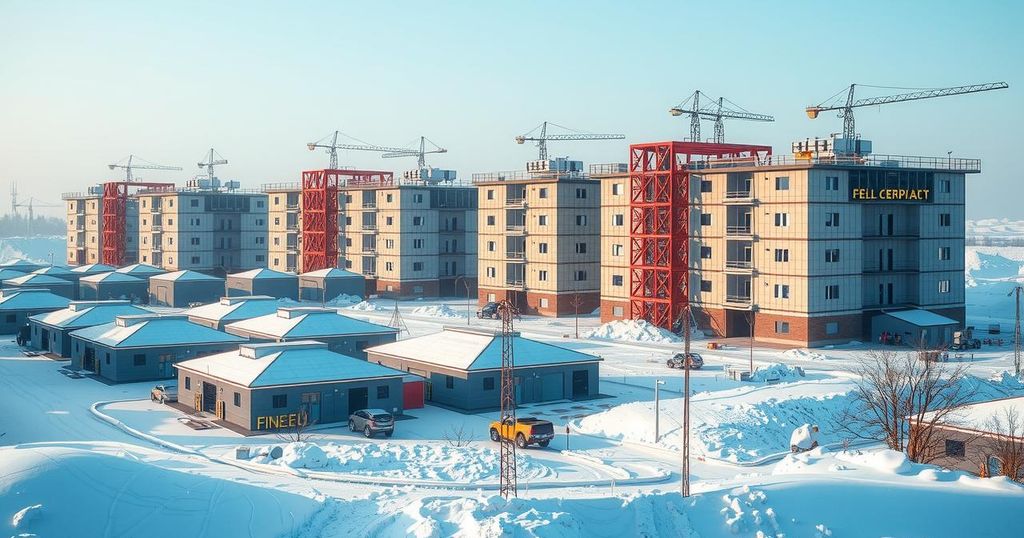North Korea Sending Thousands of Workers to Russia to Aid Drone Production

North Korea is sending tens of thousands of workers to Russia to aid in drone production, particularly Shahed drones, signaling a deepening alliance following Ukraine’s ongoing conflict. Lt. Gen. Kyrylo Budanov warns that this could reshape security dynamics across Asia and Europe, as Russia looks to bolster its military capabilities with North Korean assistance, while Ukraine prepares for intensified threats.
North Korea is reportedly sending tens of thousands of workers to Russia to assist in the production of drones, particularly the Shahed models, according to a recent report. This collaboration is seen as an extension of the increasing ties between North Korea and Russia, particularly in light of the ongoing conflict in Ukraine. Ukraine’s Defense Intelligence head, Lt. Gen. Kyrylo Budanov, has warned that this development could significantly impact security across both Europe and Asia.
The anticipated influx includes around 25,000 North Korean workers slated for the Alabuga Special Economic Zone in Russia, specifically to enhance the output of drone production. The contribution of these workers is aimed at not just enhancing production capabilities but also acquiring training on operating these unmanned vehicles. A Japanese media outlet, NKH, highlighted that the Alabuga factory, which makes approximately 2,000 drones monthly based on Iranian designs, is planning to ramp up that number to 5,000.
Supporting this assertion, satellite images reportedly reveal an expansion at the Alabuga site, aiming to accommodate the incoming workforce. Dormitories and shared facilities are being constructed, reflecting the classical housing arrangement seen in industrial sites, accommodating massive numbers of foreign workers. Ukrainian sources indicate that these developments indicate an accelerated pace for drone production, a clear signal that Russia is heavily investing in its drone arsenal.
The Shahed drones, which have proven effective in causing widespread damage across Ukraine since their introduction in September 2022, are a significant part of this strategy. Recent attacks from Russia involved launching over 100 Shahed drones at Ukraine, underscoring their status as a primary weapon in Russia’s arsenal. Moreover, improvements to these drones, including larger warheads and enhanced autonomy, pose an even greater threat to Ukrainian defenses.
Ukraine has actively targeted the Alabuga factory due to its role in producing these damaging drones, with recent attacks revealing innovative strategies using converted small aircraft to deliver explosives. One such attack emphasized the flexibility and potential power of these new assault methods, showcasing the evolving tactics in this ongoing conflict.
In addition to drone production, North Korea is also dispatching workers to assist with reconstruction efforts in Russia’s Kursk region, with Security Council Secretary Sergey Shoigu confirming the deployment of around 1,000 sappers and 5,000 additional laborers for rebuilding infrastructure.
Tensions remain high in Kurks, an area still recovering from significant fighting. Reports suggest that, despite Russian recapture efforts, the damage persists, necessitating substantial rebuilding efforts with North Korean assistance. Lt. Gen. Budanov indicated that agreements between North Korea and Russia indicate a shift in military capabilities within the region, posing a growing challenge to South Korea’s defense strategy.
These developments raise alarms for Ukraine as it braces for increased drone activity and military backing for Moscow. The provision of labor from North Korea to replace Central Asian workers, who have been labeled insecure by Russian officials, adds another layer of complexity. This also raises the specter that these laborers could transition into Russian military roles, further intertwining the two nations’ military efforts.
As Russia continues its offensive in Ukraine, the strengthening alliance with North Korea may lead to dire consequences for Ukrainian defense strategies. Increased Shahed deployments could further stress Ukrainian air defenses, where stockpiles of counter-air munitions are already under pressure. The geopolitical dynamics stemming from this cooperation signal an ongoing shift in military calculus in Northeast Asia and Eastern Europe, with Russia likely gaining a strategic edge.
In summary, North Korea’s increasing involvement in Russia’s drone production and reconstruction efforts signifies a troubling development for regional security. This partnership is likely to enhance Russia’s military capabilities while posing challenges for Ukraine, especially as the conflict continues to unfold. With the potential for thousands of North Korean workers to bolster Russian operations amidst ongoing warfare, the repercussions could fundamentally change the dynamics of the conflict.
Original Source: www.twz.com








